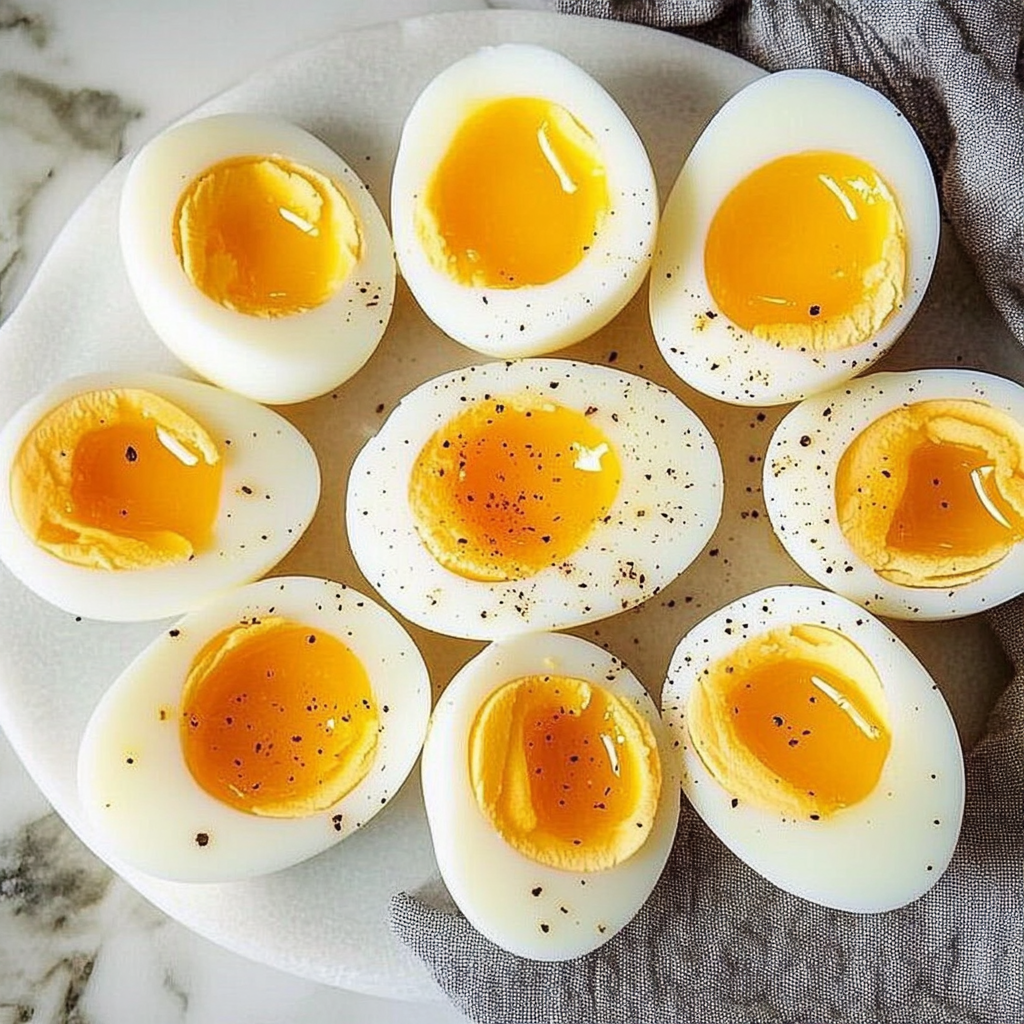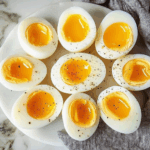Perfect boiled eggs are a must-have in any kitchen. Whether you enjoy them soft and runny or hard with a firm yolk, this method delivers consistent results every time. They’re great for breakfast, snacks, salads, and more.
Why You’ll Love This Recipe
- Customizable doneness — soft, jammy, or hard-boiled
- Only two ingredients: eggs and water
- Easy to peel when done right
- Great for meal prep, snacks, or adding protein to meals
Ingredients
(Tip: You’ll find the full list of ingredients and measurements in the recipe card below.)
- Large eggs
- Water
- Ice (for an ice bath)
Directions

- Bring water to a boil
Fill a saucepan with enough water to cover the eggs by about 1 inch. Bring it to a boil over medium-high heat. - Add the eggs
Gently lower the eggs into the boiling water using a spoon to avoid cracking. - Boil and set a timer
Cook according to your preferred doneness:- Soft-boiled: 6 minutes
- Jammy eggs: 7–8 minutes
- Hard-boiled: 10–12 minutes
- Ice bath
Once time is up, immediately transfer the eggs to a bowl of ice water and let them sit for at least 5 minutes. This stops the cooking and makes peeling easier. - Peel and enjoy
Tap the eggs gently on a hard surface and peel under running water for best results.
Servings and Timing
- Servings: 4–6
- Prep Time: 2 minutes
- Cook Time: 6–12 minutes
- Total Time: 10–15 minutes
Variations
- Steamed Eggs: Steam eggs for 12 minutes for hard-boiled texture.
- Pressure Cooker: Use the 5-5-5 method (5 mins pressure, 5 mins natural release, 5 mins ice bath).
- Seasoned Eggs: Soak peeled eggs in soy sauce or marinade for extra flavor.
Storage/Reheating
- Storage: Store unpeeled boiled eggs in the fridge for up to 1 week. If peeled, keep in an airtight container with a damp paper towel and use within 2–3 days.
- Reheating: Gently reheat peeled eggs in warm water or microwave in short bursts (cut in half to prevent bursting).
FAQs
How can I tell if an egg is still good?
Place it in a bowl of water. If it sinks, it’s fresh; if it floats, it should be discarded.
Do I need to bring the eggs to room temperature first?
Not necessary, but it can help reduce the chance of cracking in boiling water.
Why do my eggs crack when boiling?
Adding cold eggs to hot water too quickly can cause cracks. Use a spoon and lower them in gently.
How do I avoid a green ring around the yolk?
That ring comes from overcooking. Stick to the recommended timing and cool the eggs quickly in an ice bath.
What’s the best way to peel boiled eggs?
Cool them in an ice bath, then peel under running water to help loosen the shell.
Can I reuse the boiling water for another batch?
Yes, as long as it’s clean and you return it to a full boil before adding more eggs.
Why are older eggs easier to peel?
Older eggs have a higher pH which reduces the stickiness between the shell and egg white.
Can I freeze boiled eggs?
Not recommended. Freezing can change the texture, especially of the whites.
Is salt or vinegar necessary in the boiling water?
They aren’t required, but vinegar can help if an egg cracks and salt may help with easier peeling.
How long can boiled eggs sit at room temperature?
They should not sit out for more than 2 hours to avoid food safety risks.
Conclusion
Perfect boiled eggs are easy to master with a bit of timing and the right technique. Whether you prefer them soft and runny or firm and fully cooked, they’re a nutritious, protein-rich addition to your everyday meals. Try different cooking times to find your favorite!
PrintPerfect Boiled Eggs
Learn how to make perfect boiled eggs every time, whether you like them soft, medium, or hard-boiled. Great for breakfast, snacks, or salads.
- Prep Time: 2 minutes
- Cook Time: 12 minutes
- Total Time: 20 minutes
- Yield: 6 eggs 1x
- Category: Breakfast
- Method: Boiling
- Cuisine: Global
- Diet: Vegetarian
Ingredients
- 6 large eggs
- Water, enough to cover eggs by 1 inch
- Ice (for ice bath)
Instructions
- Place the eggs in a single layer in a saucepan and cover with cold water by about 1 inch.
- Bring the water to a boil over medium-high heat.
- Once boiling, cover the pot with a lid and remove from heat.
- Let the eggs sit in the hot water:
- 6 minutes for soft-boiled
- 9 minutes for medium-boiled
- 12 minutes for hard-boiled
- Immediately transfer the eggs to a bowl of ice water and let sit for at least 5 minutes.
- Gently tap and peel under running water. Serve or store in the fridge.
Notes
- Use older eggs for easier peeling.
- Peel just before serving or store unpeeled in the fridge for up to a week.
- Add a splash of vinegar to the boiling water to help prevent cracking.
Nutrition
- Serving Size: 1 egg
- Calories: 70
- Sugar: 0g
- Sodium: 65mg
- Fat: 5g
- Saturated Fat: 1.5g
- Unsaturated Fat: 3g
- Trans Fat: 0g
- Carbohydrates: 0g
- Fiber: 0g
- Protein: 6g
- Cholesterol: 185mg

